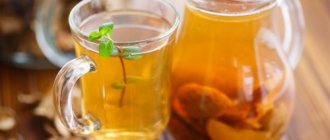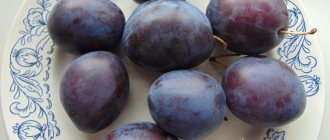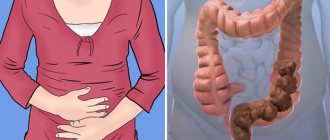Prunes for constipation perfectly help to cope with intestinal stagnation, allowing you to avoid taking laxatives. Its regular use not only eliminates existing problems with stool, but also prevents their development. However, prunes do not always completely relieve constipation, and in some cases they do not help regulate the functioning of the gastrointestinal tract at all. Why does this happen and what do you need to know about this delicacy?
The importance of nutrition for constipation
Difficulties with bowel movements occur at different ages and regardless of a person’s social status. Constipation is a common problem that is most often caused by poor diet. So, the cause of bad stool can be:
- non-compliance with diet;
- a diet full of protein foods;
- lack of fiber;
- consumption of too fatty foods;
- passion for fast food;
- insufficient amount of fluid;
- binge eating.
With frequently recurring constipation, it is especially important to monitor your diet and adhere to food intake rules. First of all, you need to give up pickles, marinades and fried foods. Also, if you have intestinal dysfunction, you should not get carried away with fresh baked goods and exclude from your diet foods with a strengthening effect (pears, legumes, green bananas, fatty meats, etc.).
For normal functioning of the gastrointestinal tract, it is important to eat more food containing plant fiber. Therefore, your daily diet must include vegetables, fruits and grains. For constipation, you should give preference to the following products:
- pumpkin;
- beets and carrots;
- broccoli;
- bananas (ripe only);
- zucchini and eggplant;
- kiwi;
- raspberries, etc.
Dried fruits have a special effect on the intestines; for example, prunes help with constipation better than many laxatives and are an excellent way to prevent it. If you use it together with dried apricots and figs, you can increase its effectiveness. The main thing is to remember that liquid is important for plant fibers, so you need to monitor your drinking regime in the same way as your food intake.
Recipes, menus and diet products
General Benefits of Prunes
Prunes are dried black plum fruits, which not only restore intestinal function, but also have a positive effect on the functioning of the entire gastrointestinal tract and the body as a whole. This dried fruit contains a large number of microelements and beneficial substances that give the following effect:
- improve food absorption;
- strengthen the walls of blood vessels;
- normalize the functioning of the cardiovascular system;
- restore performance;
- tone;
- improve the condition of the skin;
- normalize the function of the stomach and pancreas.
Among other things, prunes are rich in antioxidants that remove harmful free radicals from the body. Therefore, it is recommended for use by people living in environmentally polluted cities and those whose field of activity is related to industry.
Prunes are also an excellent means of preventing urolithiasis and have a beneficial effect on the nervous system, relieving anxiety and increasing stress resistance.
As for problems with bowel movement, regular consumption of prunes helps solve them, without the intervention of other, undesirable methods of treating fecal stagnation. It is especially important to include prunes in your diet during pregnancy. Pregnant women should not take most laxatives for
Recipes, menus and diet products
We recommend reading the article on how to deal with constipation during pregnancy?
Precautionary measures
The effectiveness of prunes as a laxative has long been proven. But before taking this product, you should find out if you are allergic to it, and if your blood sugar is high. The fact is that these conditions are contraindications.
It is recommended to drink dry berries with warm water for better absorption and do not forget about physical activity. Under no circumstances should you eat dried fruits if you have diarrhea, indigestion or obesity.
Prunes are popular in traditional and folk medicine due to their beneficial qualities. It helps in the prevention of cardiovascular diseases. This fruit helps normalize metabolic processes, lower blood pressure, and improve the functioning of the digestive system.
Prunes for constipation: how they affect the intestines
How do prunes help with constipation? The recipe is quite simple: by eating several fruits of dried black plums daily, you can cleanse the body of waste and toxins, which often cause intestinal dysfunction. In addition, prunes have a laxative effect, which is associated with the presence of plant fibers in its composition.
Plant fibers are the so-called cellulose, which is characterized by the ability to adsorb water. Once in the intestines, it absorbs liquid and, turning into a gel-like substance, envelops the accumulated feces. Fiber has the ability to soften feces, which ensures their free and easy exit. Therefore, it is recommended to eat dried fruits if you have hemorrhoids and anal fissures.
In addition, plant fibers, including prunes, are a kind of bulk laxatives of natural origin. By absorbing water, they increase the volume of intestinal contents. This process has an irritating effect on the smooth muscles of the walls and activates the contraction of peristalsis, which causes the act of defecation.
No less useful is a decoction of prunes for constipation . When prepared correctly, you can improve the functioning of the entire gastrointestinal tract and restore the functioning of the intestines themselves. Decoctions and tinctures of dried fruits can improve the microflora of the gastrointestinal tract and make the process of bowel movements regular.
Selection of fruit and principle of operation
Dried plums need to be selected correctly. You can check this in a simple way: the berry should be matte black and should not leave marks on your fingers. If there is a shine, the fruit has been treated with glycerin. It must be washed before use. Contains organic acids, tannins and pectin.
When soaked, the product swells. The normal condition is when it turns white in some places. This indicates that the drying process occurred without the use of chemicals.
For prunes to become a medicine, you need to choose high quality fruits. They are prepared in the classic way without the use of preservatives. When purchasing, pay attention to the packaging. It should be transparent. It is better to purchase fruits by weight. Good plums are elastic, with moderate gloss, and uniform in color.
You should not buy dry or spreading fruits. They should have a pleasant smell, be free of damage and foreign impurities. If you don’t like the taste of the fruits, it is recommended to mix them with dried apricots and figs. They also have a beneficial effect and are rich in vitamins and minerals.
The principle of operation of the product is simple. Contains a lot of fiber. After entering the stomach, the fibers are saturated with water, turning into a gel. It envelops feces, softens them so that they leave the intestines faster. This allows you to take fruits for constipation, hemorrhoids, and anal fissures.
When prunes won't help
Despite all the benefits of this dried fruit, it still does not always help cope with fecal stagnation. So, if constipation is chronic and occurs with a complete absence of bowel movements, then prunes will not bring the desired result. What is this connected with?
The effectiveness of prunes primarily depends on the type of constipation. Gastroenterologists recommend including it in the diet for problems with bowel movements associated with poor diet and lack of physical activity. If the cause of frequent constipation is more serious, then the treatment of the pathology should be comprehensive, including not only diet, but also drug therapy.
Recipes, menus and diet products
Prunes will not help if intestinal dysfunction is caused by the following reasons:
- physical inactivity;
- long-term use of medications;
- toxic poisoning;
- endocrine pathologies;
- neoplasms in the intestines;
- intestinal obstruction;
- psychoemotional disorders;
- intestinal atony;
- dysbacteriosis, etc.
Also, eating prunes for constipation will be ineffective if a fecal impaction forms. If constipation is accompanied by a complete absence of stool, pain in the lower abdomen and deterioration in general well-being, then the treatment of the disease should be approached with the utmost seriousness. In order for prunes to bring the desired effect when consumed, it is important to monitor the drinking regime. A large amount of fiber in the diet can, on the contrary, cause bad stools if a person does not drink the required amount of water per day. This is why prunes do not always help with constipation. Reviews from people suffering from frequent problems with bowel movements indicate that when introducing dry plums into the diet, you need to drink up to 2 liters of ordinary water.
We recommend reading the article about complex therapy for constipation.
Recipes for complete meals
Wholesome tasty meals with the addition of dried fruits will help you cope with constipation. They will help the body recharge itself and cope with the disease faster. The following recipes are considered the most effective:
- Salad. Prepare feijoa, prunes and dried apricots. Cut all ingredients into small cubes and mix. Olive oil is perfect as a dressing for this lard.
- Salad with figs. Using a blender, puree the figs and prunes. Add some coriander. This salad should be eaten before breakfast. Store the remaining mixture in the refrigerator.
- Beet salad. Grate the pre-cooked beets. Add a handful of chopped nuts and prunes cut into small pieces. Season with olive oil. This dish can be eaten several times a day.
- Salad with beets and apples. You will need 1 large beet, 10 prunes, 1 green apple, some hazelnuts, sour cream. Rinse the prunes thoroughly and pour boiling water over them for half an hour. After this, cut into small cubes. Boil the beets, peel and grate. Grind the apple using a grater. Chop the nuts with a knife. Mix all ingredients in a salad bowl. Season with a small amount of sour cream.
- Salad with cheese and carrots. To prepare, prepare 1 beet and carrot, 100 grams of prunes, the same amount of dried apricots, 150 grams of hard cheese, 2 eggs, some herbs and sour cream. Boil vegetables and eggs until tender. Grate on a coarse grater. Steam dried fruits in boiling water, and then cut into small pieces. Place a layer of beets mixed with prunes on a dish. Grease it with sour cream. Place a layer of carrots and dried apricots on top. Coat with sour cream again. The last layer should be a mixture of eggs, cheese and herbs. You can decorate this salad with pomegranate seeds.
- Buckwheat porridge. Steam 100 grams of prunes and dried apricots in boiling water. Boil the buckwheat. Mix diced dried fruits with the finished porridge. Add some butter. The dish is brought to full readiness in the oven. Sprinkle lightly with walnuts before serving.
- Curd dessert. Steam 15 prunes. Cut them in half. Stuff each half with cottage cheese mixed with an egg and a little sugar. Place on a baking sheet. Stick a small piece of walnut into each half. Bake in the oven.
- Dried fruit soup. To prepare it you will need 2 large potatoes, 100 grams of dried apricots and prunes, half a bunch of dill. Peel the potatoes and cut into cubes. Chop the washed dill. Boil one and a half liters of water. Send her dried fruits and potatoes. Add a little salt. Cook until done. At the very end, throw the dill into the saucepan. This dish has an unusual taste and delicate aroma.
- Semolina. Wash 100 grams of semolina and soak it for 2 hours in warm boiled water. Boil 300 ml of milk. Stirring constantly, add semolina into it. Add 20 grams of chopped prunes, a little sugar and salt. Cook for 10 minutes. Season the finished porridge with a piece of butter and enjoy the delicious dish.
What is the best way to eat prunes? Whichever one you choose, the effect will not be long in coming. All dishes are not only effective, but also very tasty.
Who shouldn't eat prunes?
Dried homemade plums are very useful for both adults and children. Prune compote is especially useful for infants against constipation, which manifests itself against the background of the introduction of new complementary foods. However, there is a category of people for whom treatment of stool with this delicacy is contraindicated.
It is not recommended to eat prunes in the following cases:
- a history of diabetes mellitus;
- personal intolerance to fiber;
- allergic reaction to plums;
- tendency to corpulence;
- for chronic cholecystitis;
- stones in the kidneys.
In addition, prunes should be avoided during lactation, as their excessive consumption can cause gastrointestinal problems in the newborn. This product is undesirable for hypotensive patients and people who have chronic gastric and duodenal ulcers.











